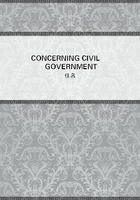
第18章
74. To conclude, then, though the father's power of commanding extends no farther than the minority of his children, and to a degree only fit for the discipline and government of that age; and though that honour and respect, and all that which the Latins called piety, which they indispensably owe to their parents all their lifetime, and in all estates, with all that support and defence, is due to them, gives the father no power of governing- i.e., making laws and exacting penalties on his children; though by this he has no dominion over the property or actions of his son, yet it is obvious to conceive how easy it was, in the first ages of the world, and in places still where the thinness of people gives families leave to separate into unpossessed quarters, and they have room to remove and plant themselves in yet vacant habitations, for the father of the family to become the prince of it;* he had been a ruler from the beginning of the infancy of his children; and when they were grown up, since without some government it would be hard for them to live together, it was likeliest it should, by the express or tacit consent of the children, be in the father, where it seemed, without any change, barely to continue. And when, indeed, nothing more was required to it than the permitting the father to exercise alone in his family that executive power of the law of Nature which every free man naturally hath, and by that permission resigning up to him a monarchical power whilst they remained in it. But that this was not by any paternal right, but only by the consent of his children, is evident from hence, that nobody doubts but if a stranger, whom chance or business had brought to his family, had there killed any of his children, or committed any other act, he might condemn and put him to death, or otherwise have punished him as well as any of his children. which was impossible he should do by virtue of any paternal authority over one who was not his child, but by virtue of that executive power of the law of Nature which, as a man, he had a right to; and he alone could punish him in his family where the respect of his children had laid by the exercise of such a power, to give way to the dignity and authority they were willing should remain in him above the rest of his family.
* "It is no improbable opinion, therefore, which the arch-philosopher was of, That the chief person in every household was always, as it were, a king; so when numbers of households joined themselves in civil societies together, kings were the first kind of governors among them, which is also, as it seemeth, the reason why the name of fathers continued still in them, who of fathers were made rulers; as also the ancient custom of governors to do as Melchizedec; and being kings, to exercise the office of priests, which fathers did, at the first, grew, perhaps, by the same occasion.
Howbeit, this is not the only kind of regimen that has been received in the world. The inconveniencies of one kind have caused sundry others to be devised, so that, in a word, all public regimen, of what kind soever, seemeth evidently to have risen from the deliberate advice, consultation and composition between men, judging it convenient and behoveful, there being no impossibility in Nature, considered by itself, but that man might have lived without any public regimen." Hooker, Eccl. Pol., i. 10.
75. Thus it was easy and almost natural for children, by a tacit and almost natural consent, to make way for the father's authority and government. They had been accustomed in their childhood to follow his direction, and to refer their little differences to him; and when they were men, who was fitter to rule them? Their little properties and less covetousness seldom afforded greater controversies; and when any should arise, where could they have a fitter umpire than he, by whose care they had every one been sustained and brought up. and who had a tenderness for them all? It is no wonder that they made no distinction betwixt minority and full age, nor looked after one-and-twenty, or any other age, that might make them the free disposers of themselves and fortunes, when they could have no desire to be out of their pupilage. The government they had been under during it continued still to be more their protection than restraint; and they could nowhere find a greater security to their peace, liberties, and fortunes than in the rule of a father.
76. Thus the natural fathers of families, by an insensible change, became the politic monarchs of them too; and as they chanced to live long, and leave able and worthy heirs for several successions or otherwise, so they laid the foundations of hereditary or elective kingdoms under several constitutions and manors, according as chance, contrivance, or occasions happened to mould them. But if princes have their titles in the father's right, and it be a sufficient proof of the natural right of fathers to political authority, because they commonly were those in whose hands we find, de facto, the exercise of government, I say, if this argument be good, it will as strongly prove that all princes, nay, princes only, ought to be priests, since it is as certain that in the beginning "the father of the family was priest, as that he was ruler in his own household."